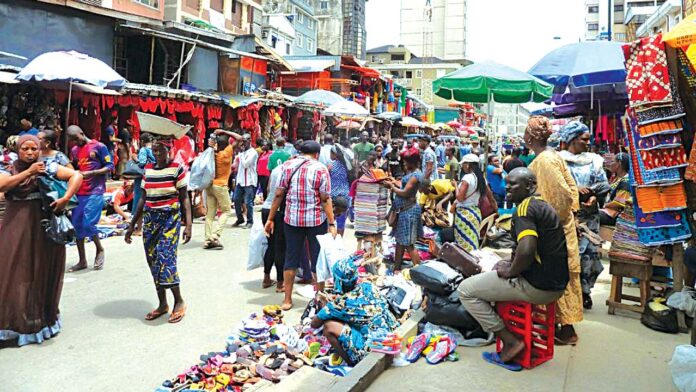The Senate Minority Leader, Sen. Enyinnaya Abaribe, on Monday in Abuja, urged Nigerians to patronise locally made goods, saying that it would have great impacts on local industries.
Abaribe made the appeal at a joint press conference with the Small and Medium Enterprises Development Agency (SMEDAN) to herald the commencement of the 8th Made-in-Aba trade fair.
The lawmaker who represents Abia-South Senatorial District of Abia, said that the 2021 edition of the trade fair was scheduled for Nov. 8 to Nov. 13 in Abuja.
The theme of the event is “Harnessing Business Opportunities beyond Covid-19 Drawbacks” -‘‘MSMEs; the bedrock for nation building and inclusive recovery’’.
Abaribe, who is the facilitator of the trade fair, stressed that Made-in-Aba goods were receiving global acceptance due to improved qualities thus the need to stimulate increased patronage.
According to him, the trade fair will provide a platform for the artisans to deepen their market and improve the quality of the goods produced locally.
Abaribe added that the trade fair would be a celebration of success in the advancement of Nigerian made goods.
“Our focus is in the finishing, packaging of the products and efforts to raise the quality of goods made in Aba and by extension goods made in Nigeria,’’ he said.
While commending the Federal Government for emphasising the need to buy goods made locally, Abaribe said that the country needed to look inwards to grow its economy.
“Because of emphasis on making sure that we buy locally made goods, effects of COVID-19 pandemic and the general economic down turn, we have no options now than to look inwards.
“It is important to find a way of ensuring that we do not spend our scarce foreign exchange in importing products that we can make in this country,’’ the lawmaker stressed.
He urged SMEDAN to continue to engage the Micro Small and Medium Enterprises (MSMEs) toward improving the quality of their products.
“Part of what we have to overcome with Made-in-Aba goods is that when we started, most of the shoes, bags and belts had foreign stamps on them.
“When we asked, they said that people prefer to buy foreign made goods but as we have promoted this they no longer do that. They now make their products and put their own stamps.
“Today, the artisans; fashion designers, shoemakers, and various other manufacturers are not ashamed to label their product made in Aba, as no obvious difference between made in Aba and imported products.
“The quality has improved significantly and for some years now all my clothes, shoes are made in Aba including the suit I am wearing today,” the senator said.
He recalled that through SMEDAN, the artisans were able to improve their qualities and have been linked with off-takers from many parts of the country that buy off their goods from the point of production.
Earlier, the Director- General of SMEDAN, Dr Dikko Radda, said that the programme aimed at exposing entrepreneurs from Aba business cluster to further development and standardisation of their products to meet national and international markets.
According to Radda, the trade fair will bring to limelight the challenges and prospects of MSMEs as well as increase public awareness among the target participants on the strategic benefit of taking part in the fair.
He noted that SMEDAN would create accessible venue for exhibition so as to deepen the market access of participating MSMEs.
“The fair is major tool for promotion, communication, marketing, networking and strong platform for cross fertilisation of ideas.
“This annual event will be implemented in three phases, pre-exhibition, exhibition, and post-exhibition,’’ he said.
Radda urged indigenes of Abia to leverage on government intervention programmes to enhance their products and services especially where they have comparative and competitive advantages.
According to him, clusters in Aba will have the opportunity to interact with SMEDAN one-on-one, acquire business information, make general enquiries and access free business counselling.
“They can also interface with business and other agencies for enquiries, access relevant information peculiar to their various businesses.
“On the supply side, the fair also gives the SMEDAN the opportunity to assess the capabilities of MSMEs to enable us design need-based intervention programmes,’’ Radda said.
While reiterating the agency’s commitment to continue to support MSMEs, Radda urged the National Assembly members to emulate Abaribe by partnering with SMEDAN in adopting similar programme at various levels for their constituents.
The ‘Made in Aba Trade Fair’ is a flagship trade promotion activity between the National Assembly and SMEDAN through the Zonal Intervention Programmes.




